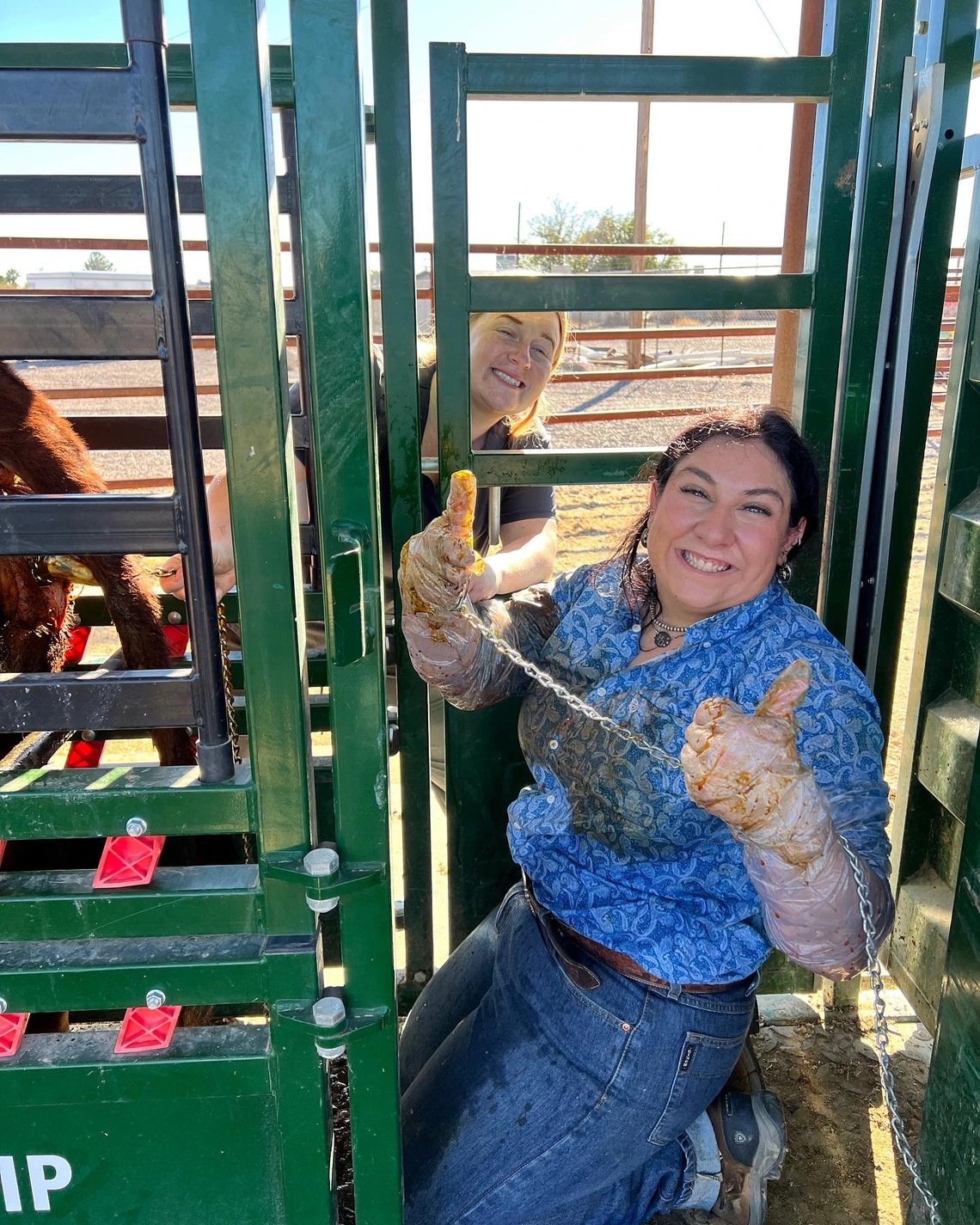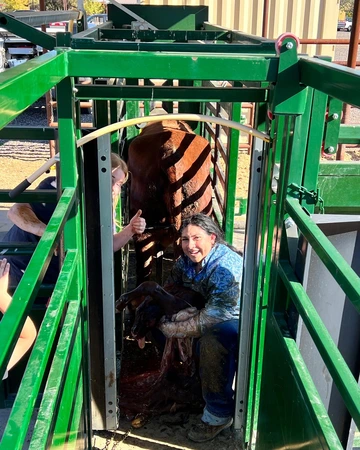2023 Grads Serve Southern Arizona
We spoke with Dr. Hannah Bates and Dr. Kaitlyn Benally, two Class of 2023 graduates who are now working at veterinary practices in southern Arizona.

Dr. Hannah Bates
At our inaugural graduation ceremony in August 2023, over 100 VetCats stepped out of veterinary school and into their roles as day-one-ready veterinarians in their communities. After three years dedicated to intensive hands-on learning, our students were equipped with the skills and knowledge required for their careers.
We spoke with Dr. Hannah Bates and Dr. Kaitlyn Benally, two Class of 2023 graduates who are now working at veterinary practices in southern Arizona. Their passion for large animal medicine makes them an asset to their communities and has brought them exciting professional opportunities.
Dr. Hannah Bates
Dr. Bates has had a passion for rural veterinary medicine since before beginning veterinary school and is now able to be a part of providing care where it is sorely needed. A resourceful veterinarian, she understands the importance of bringing her best to her community and leaving people and animals better than how she found them.

Tell us a little about your experience so far as a veterinarian. Where are you working and what do you do there?
HB: I am working at Desert Cross Veterinary Hospital. It is a rural mixed practice in Thatcher, AZ. We see all creatures great and small, including but not limited to Guinea pigs, rabbits, pigs, sheep, goats, horses, cows, dogs, and cats. Quite literally anything that walks through the door. We do not turn any patients away and aim to help as many animals and people as possible.
Why did you choose to pursue this area of veterinary medicine?
HB: I chose to pursue this area of veterinary medicine because rural communities need more rural veterinarians to increase access to care. I also chose it to help myself grow to become more comfortable with the uncomfortable. In rural medicine, you commonly don’t get a “final answer,” which can be difficult at times when you just spent the last 3 years piecing together puzzles to get the perfect diagnosis. But people need help and if you are willing to try, so are they. Sometimes you have to tell people that you quite frankly have no idea, but let’s try this, and often people are open to that honesty. Inaction often results in more harm than just trying something. I love that I feel I am helping people, and the community is genuinely appreciative of it.
How do you feel your veterinary school experiences prepared you for work here?
HB: I feel my veterinary school experiences prepared me for work here because they taught me to be a teacher and learner in my community. Every day I get the opportunity to educate people to help them help their pets or livestock, as well as learn from these hard-working people so that I can better serve their needs.
What is your favorite part of practicing veterinary medicine?
HB: My favorite part of practicing veterinary medicine is that there is always something new to learn every single day. I also love “MacGyver-ing” and having to think outside the box which I get to do every single day. As they say, a lot of animals forgot to read the textbook.
What are some of your longer-term professional aspirations?
HB: My longer-term professional aspirations involve building a successful equine breeding program here.
Kaitlyn Benally
Dr. Benally is currently working as an intern in equine medicine. Her passion for exploration led her to seize the opportunity to learn more deeply about this area of practice. Her clinical rotation at Arizona Equine Medical and Surgical Center offered her diverse learning opportunities and gave her the experience she needed to know she wanted to pursue an internship there. Through her internship, Dr. Benally is sharpening her clinical acumen and learning more about the type of veterinarian she aims to be throughout her career.
Tell us a little about your experience so far as a veterinarian. Where are you working and what do you do there?
KB: I am an intern at Arizona Equine Medical and Surgical Center. Working as an intern these past few months has been a lot of fun, a lot of work, and a lot of learning. I've been exposed to a large caseload, and as the intern, it's my priority to care for all hospitalized patients. Like doing daily exams, working with the overseeing doctor to create treatment plans, assist in surgeries, and be available to talk with clients about their animals.
Why did you choose to pursue this area of veterinary medicine?
KB: When I was in school, I was sure that I was going to be a mixed animal veterinarian. I like working with large and small animals. When I did my rotation at Arizona Equine, I learned so much and worked well with all the staff. When I was offered the internship, I didn't want to hold back. I knew this clinic was a good place to learn and could help me figure out what type of veterinarian I want to be.
How do you feel your veterinary school experiences prepared you for work here?
KB: I think the clinical year experience helped, [because] I was exposed to more technical skills during that time.
What is your favorite part of practicing veterinary medicine?
KB: Coming to work and being excited about the cases I get to see. The surprises and all. I can look at the schedule and see "walking funny" then the patient comes in and we get to figure out what is wrong.
What are some of your longer-term professional aspirations?
KB: I think it's too soon for me to tell where I'll end up as a doctor. I have a broad goal right now, to become a veterinarian my clients can trust.
As the demand for skilled large animal veterinarians remains strong, veterinarians like Dr. Bates and Dr. Benally are addressing the needs of rural communities by providing quality care. As Arizona graduates continue exploring and becoming skilled in large animal medicine, they will continue to fill vital roles in rural veterinary medicine while they educate and support their communities.
